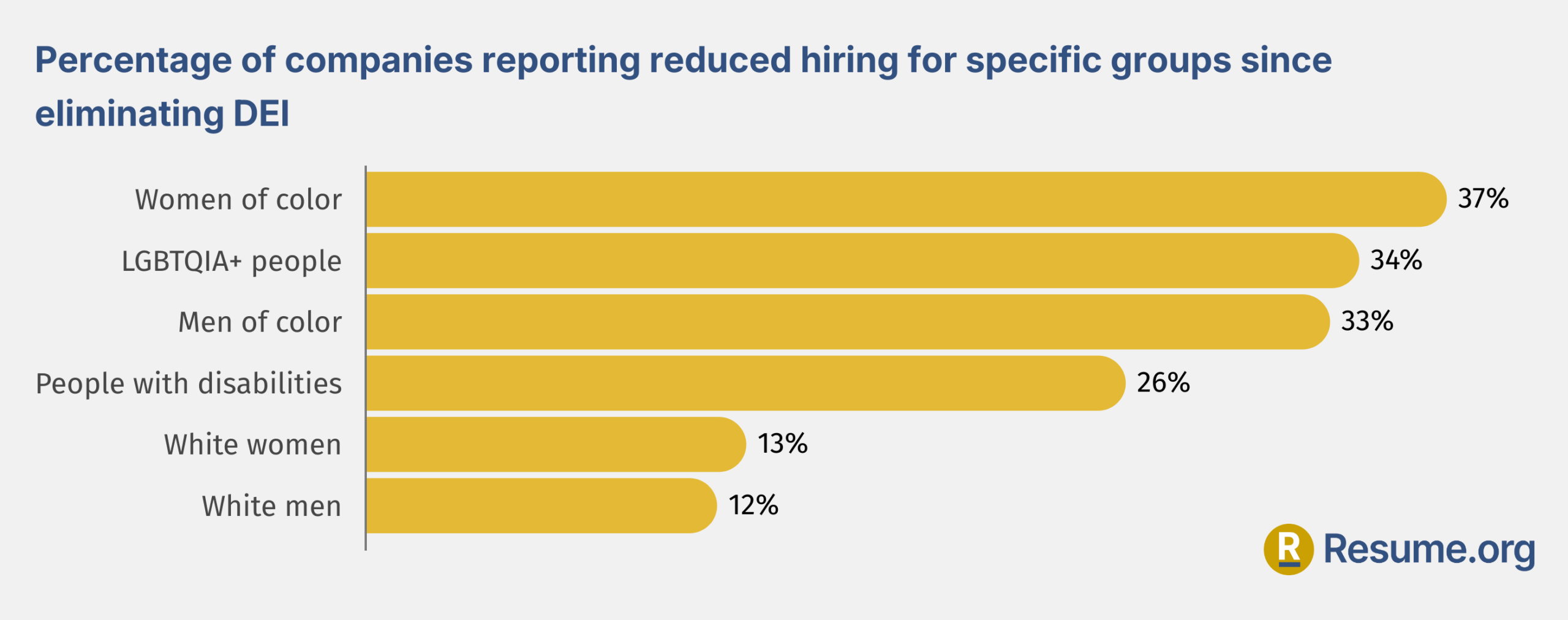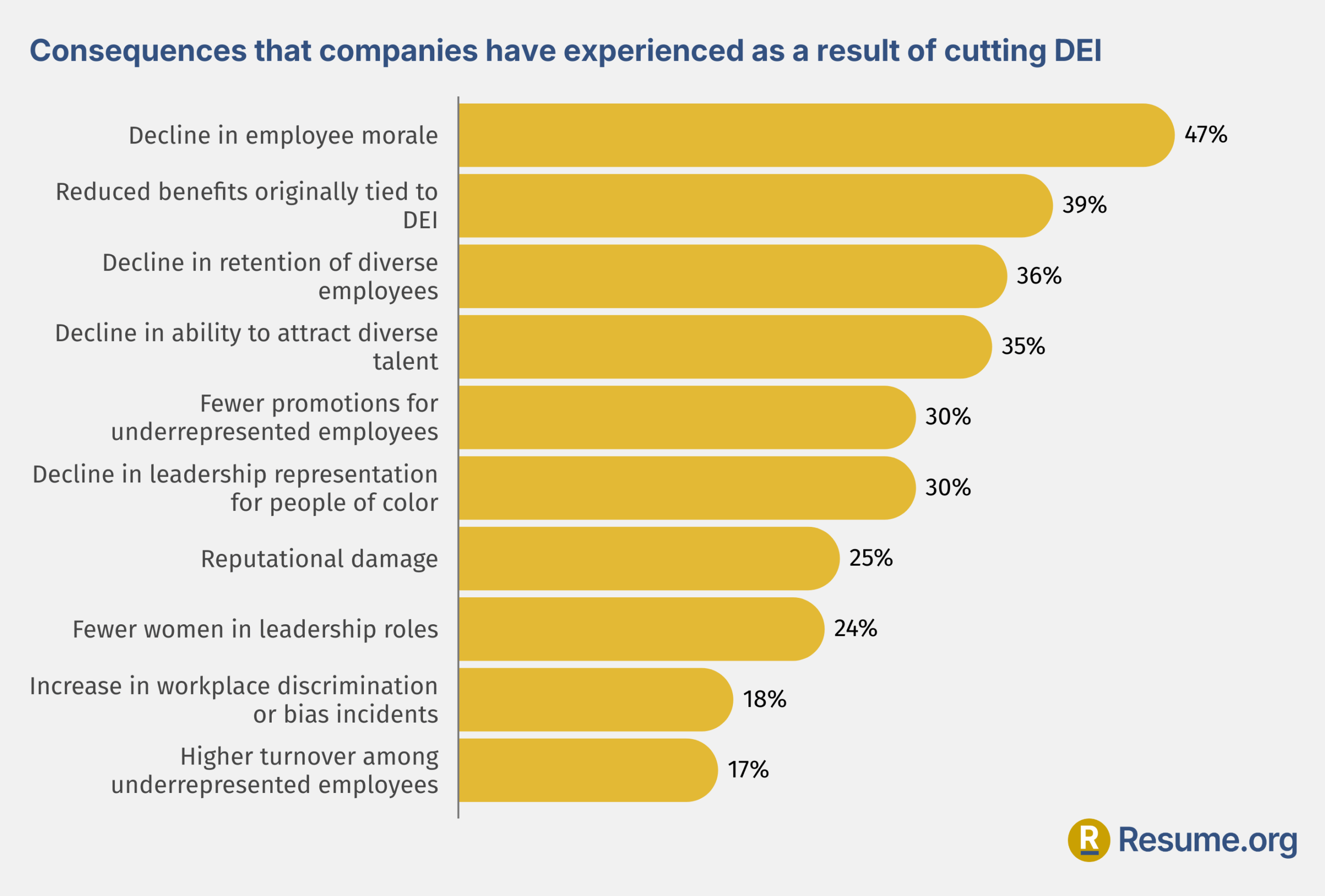- 1 in 5 Companies Eliminated DEI Since Trump’s Reelection
- Majority of Companies That Made Cuts to DEI Are Hiring Fewer Underrepresented Workers
- 1 in 3 Companies That Slashed DEI Efforts Are Promoting Fewer Underrepresented Employees
- Business Leaders Report Mixed Feelings About Their Company’s DEI Cuts
In July, Resume.org surveyed 965 companies that had diversity, equity, and inclusion (DEI) programs before November 2024 to understand how these initiatives have changed since President Trump’s election.
Major takeaways:
- 1 in 5 companies eliminated DEI since Trump’s reelection
- 10% of companies with DEI programs reduced their investment
- 57% of companies that eliminated DEI report decreases in hiring of one or more underrepresented groups
- 1 in 3 companies that cut DEI programs report promoting fewer underrepresented workers
- Half of companies that cut DEI say morale is down, and 1 in 5 say reports of discrimination and bias are up
1 in 5 Companies Eliminated DEI Since Trump’s Reelection
Since President Trump’s reelection in November 2024, 20% of companies have eliminated their DEI programs entirely. Among the 80% of companies that still have a DEI program, the majority (71%) say it hasn’t changed, but 11% report reducing their efforts.
Of those that scaled back or cut DEI altogether, the top reason — cited by 74% of business leaders — is a shift in the political climate.
Many companies that haven’t eliminated DEI initiatives since Trump’s election are considering doing so. About 16% are likely to eliminate their program by the end of 2025, and another 7% expect to do so within the next four years.
While some companies are backing away from DEI, business leaders are conflicted. Most agree that these initiatives meaningfully improved diversity and inclusion and are key drivers of employee satisfaction and retention.
Majority of Companies That Made Cuts to DEI Are Hiring Fewer Underrepresented Workers
Among those that eliminated DEI programs, 57% report hiring fewer underrepresented workers. More specifically, 37% say hiring of women of color has declined, along with 33% who report fewer LGBTQIA+ hires, 33% who report fewer men of color being hired, and 26% who say hiring of people with disabilities has declined. About 13% report fewer white women being hired.
In contrast, the decline in hiring white candidates has been notably smaller: 12% report a drop in hiring white men.
These disparities suggest that reductions in DEI efforts disproportionately affect already underrepresented groups.
 “Eliminating DEI programs, particularly due to political pressure, is short-sighted and creates long-term risks,” says Kara Dennison, head of career advising at Resume.org. “Companies that cut DEI programs are hiring fewer underrepresented employees, leading to reduced innovation, lower performance, and weaker talent pipelines. Many report declining morale and rising incidents of discrimination, signaling damage to culture and psychological safety.
“Eliminating DEI programs, particularly due to political pressure, is short-sighted and creates long-term risks,” says Kara Dennison, head of career advising at Resume.org. “Companies that cut DEI programs are hiring fewer underrepresented employees, leading to reduced innovation, lower performance, and weaker talent pipelines. Many report declining morale and rising incidents of discrimination, signaling damage to culture and psychological safety.
“DEI initiatives shouldn’t be political; they should be strategic. They can help attract top talent, foster inclusive leadership, and boost retention, especially among younger and more diverse employees. Companies that abandon DEI risk reputational harm, disengagement, and an inability to adapt to an increasingly global, values-driven marketplace.”
1 in 3 Companies That Slashed DEI Efforts Are Promoting Fewer Underrepresented Employees
Nearly half of companies (47%) that pulled back on DEI report a decline in employee morale, and 39% say they’ve reduced benefits that were originally tied to DEI.
Additionally, more than one-third of companies report a drop in both retention (36%) and attraction (35%) of diverse talent. Roughly 3 in 10 acknowledge fewer promotions for underrepresented employees (30%) and decreased leadership representation for people of color (30%). Meanwhile, 24% report fewer women in leadership roles. Some companies are experiencing reputational damage (25%), and 18% report an increase in workplace discrimination or bias-related incidents.
 “Slashing DEI programs often leads to immediate declines in morale and retention, especially among underrepresented employees who no longer feel supported or valued. DEI fosters belonging and psychological safety, which are critical to employee engagement and loyalty. Without it, trust erodes and turnover increases,” says Dennison.
“Slashing DEI programs often leads to immediate declines in morale and retention, especially among underrepresented employees who no longer feel supported or valued. DEI fosters belonging and psychological safety, which are critical to employee engagement and loyalty. Without it, trust erodes and turnover increases,” says Dennison.
“Removing DEI signals that inclusion is no longer a priority, which can encourage harmful behavior and silence affected voices. This creates a toxic culture, weakens future leadership, and puts both reputation and performance at risk.”
Business Leaders Report Mixed Feelings About Their Company’s DEI Cuts
While many companies reduced or eliminated DEI programs in response to political pressure or shifting priorities, reactions from business leaders reveal a stark divide in how those decisions are perceived internally.
Some respondents expressed frustration with DEI efforts, describing them as counterproductive or harmful to workplace culture. Several saw DEI initiatives as performative or divisive, and felt their removal restored a sense of fairness:
- “It has caused more problems than it solved. White employees felt discriminated against, causing workplace tension.”
- “DEI in the workplace was a totally worthless program. Really did nothing for the employees but possibly hindered development.”
- “DEI was very divisive. Good that we eliminated it.”
“My company’s DEI practices were very obviously performative and didn’t drive any real change or improvements at all.”
Others voiced disappointment or concern about the consequences of pulling back on diversity initiatives. They pointed to reduced morale, reputational damage, and the loss of progress made in recent years:
- “It seems to have stalled due to budgetary concerns and possibly due to the political environment. I would prefer that it have been maintained, if not expanded.”
“DEI was valuable, and I’m very disappointed that it has been eliminated.” - “We are worse off as a company and our place in society since dropping the DEI policy.”
- “I thought DEI created a safe space for us all. It allowed us to feel represented. The company removed them with no notice and did not provide any mention of it or reasoning.”
Methodology: Resume.org commissioned this survey, and it was conducted via Pollfish in July 2025. A total of 965 U.S. business leaders participated. Demographic and screening criteria ensured appropriate respondents.
To view all of our other research and studies go to our research page.
Resume.org offers free, HR approved resume templates to help you create a professional resume in minutes. Choose from several template options and even pre-populate a resume from your profile.